TUI Group: Waste Production, Sustainability & Organisational Impact
VerifiedAdded on 2023/06/12
|8
|2159
|453
Report
AI Summary
This report investigates the impact of waste production sustainability issues on organisational performance, specifically focusing on TUI Group, a British-German travel and tourism company. It explores the concept of sustainable practices, identifies the negative impacts of waste production on TUI's overall performance, and determines strategies for decreasing waste production in the tourism sector. The research employs a qualitative approach, utilizing secondary data and thematic analysis to assess the problems faced by the tourism sector due to increasing waste, and highlighting sustainable practices for waste reduction. Findings emphasise the importance of sustainable practices like total quality management, six sigma, and lean manufacturing in improving quality, reducing waste, and enhancing overall organisational performance, ultimately enabling companies to retain employees, attract customers, and achieve zero emissions.
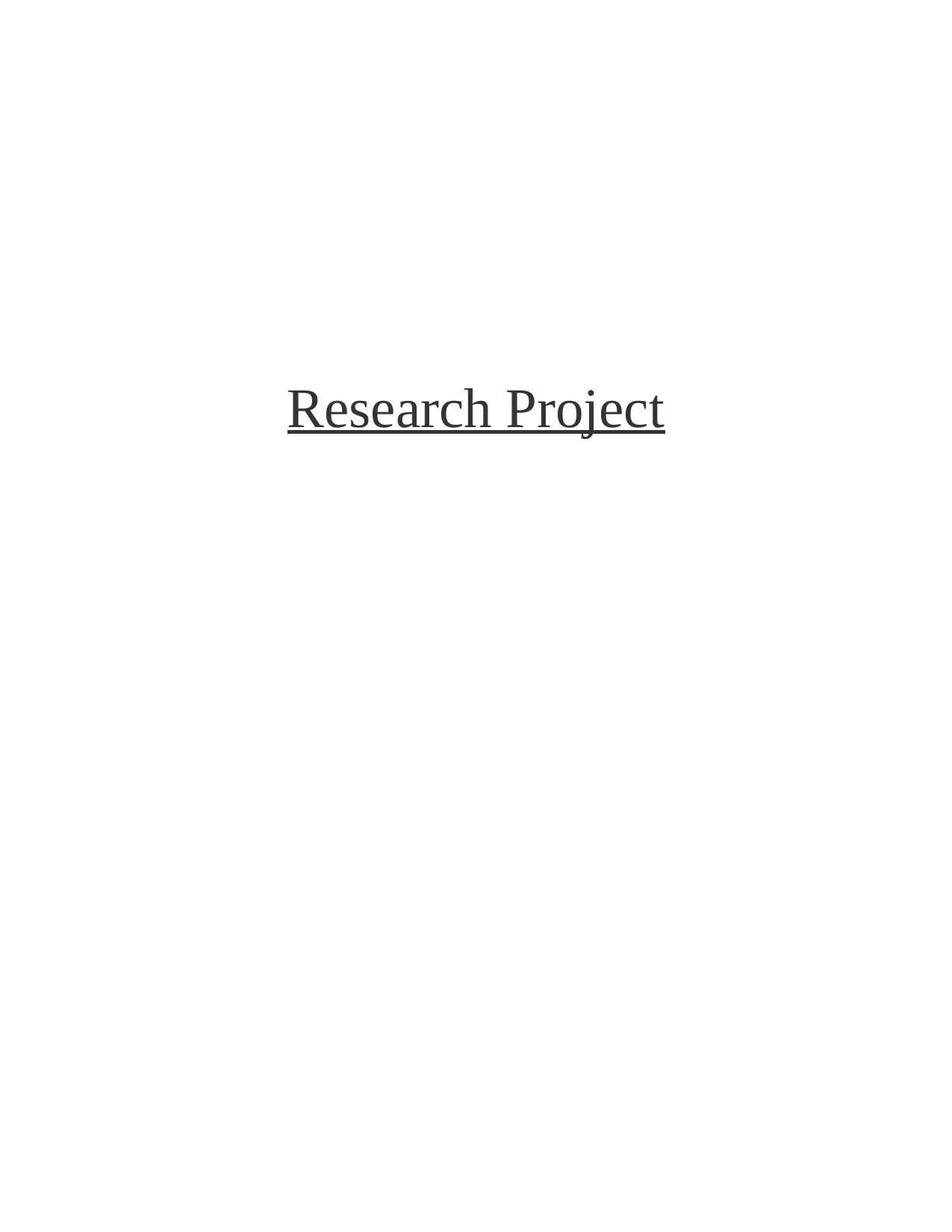
Research Project
Paraphrase This Document
Need a fresh take? Get an instant paraphrase of this document with our AI Paraphraser
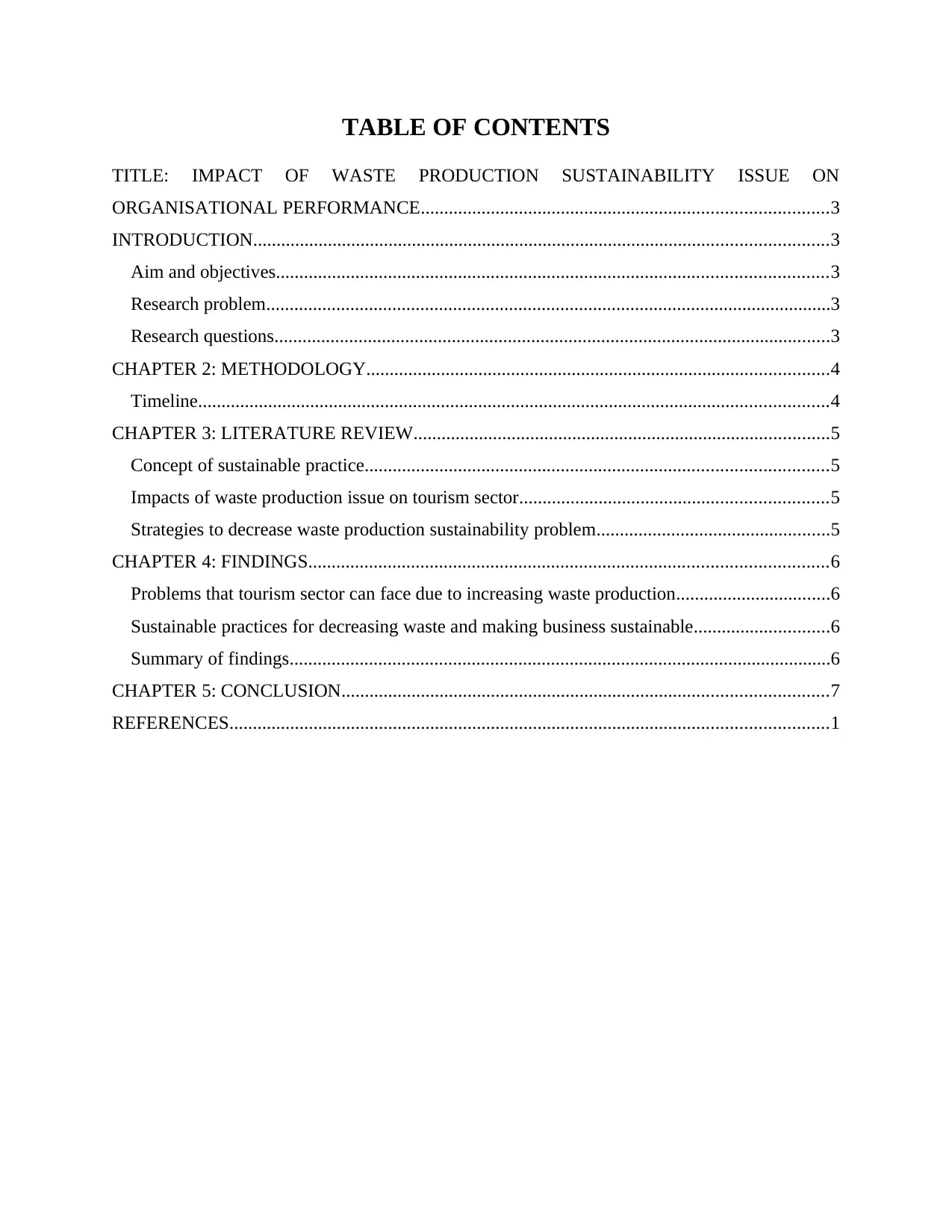
TABLE OF CONTENTS
TITLE: IMPACT OF WASTE PRODUCTION SUSTAINABILITY ISSUE ON
ORGANISATIONAL PERFORMANCE.......................................................................................3
INTRODUCTION...........................................................................................................................3
Aim and objectives......................................................................................................................3
Research problem.........................................................................................................................3
Research questions.......................................................................................................................3
CHAPTER 2: METHODOLOGY...................................................................................................4
Timeline.......................................................................................................................................4
CHAPTER 3: LITERATURE REVIEW.........................................................................................5
Concept of sustainable practice...................................................................................................5
Impacts of waste production issue on tourism sector..................................................................5
Strategies to decrease waste production sustainability problem..................................................5
CHAPTER 4: FINDINGS...............................................................................................................6
Problems that tourism sector can face due to increasing waste production.................................6
Sustainable practices for decreasing waste and making business sustainable.............................6
Summary of findings....................................................................................................................6
CHAPTER 5: CONCLUSION........................................................................................................7
REFERENCES................................................................................................................................1
TITLE: IMPACT OF WASTE PRODUCTION SUSTAINABILITY ISSUE ON
ORGANISATIONAL PERFORMANCE.......................................................................................3
INTRODUCTION...........................................................................................................................3
Aim and objectives......................................................................................................................3
Research problem.........................................................................................................................3
Research questions.......................................................................................................................3
CHAPTER 2: METHODOLOGY...................................................................................................4
Timeline.......................................................................................................................................4
CHAPTER 3: LITERATURE REVIEW.........................................................................................5
Concept of sustainable practice...................................................................................................5
Impacts of waste production issue on tourism sector..................................................................5
Strategies to decrease waste production sustainability problem..................................................5
CHAPTER 4: FINDINGS...............................................................................................................6
Problems that tourism sector can face due to increasing waste production.................................6
Sustainable practices for decreasing waste and making business sustainable.............................6
Summary of findings....................................................................................................................6
CHAPTER 5: CONCLUSION........................................................................................................7
REFERENCES................................................................................................................................1
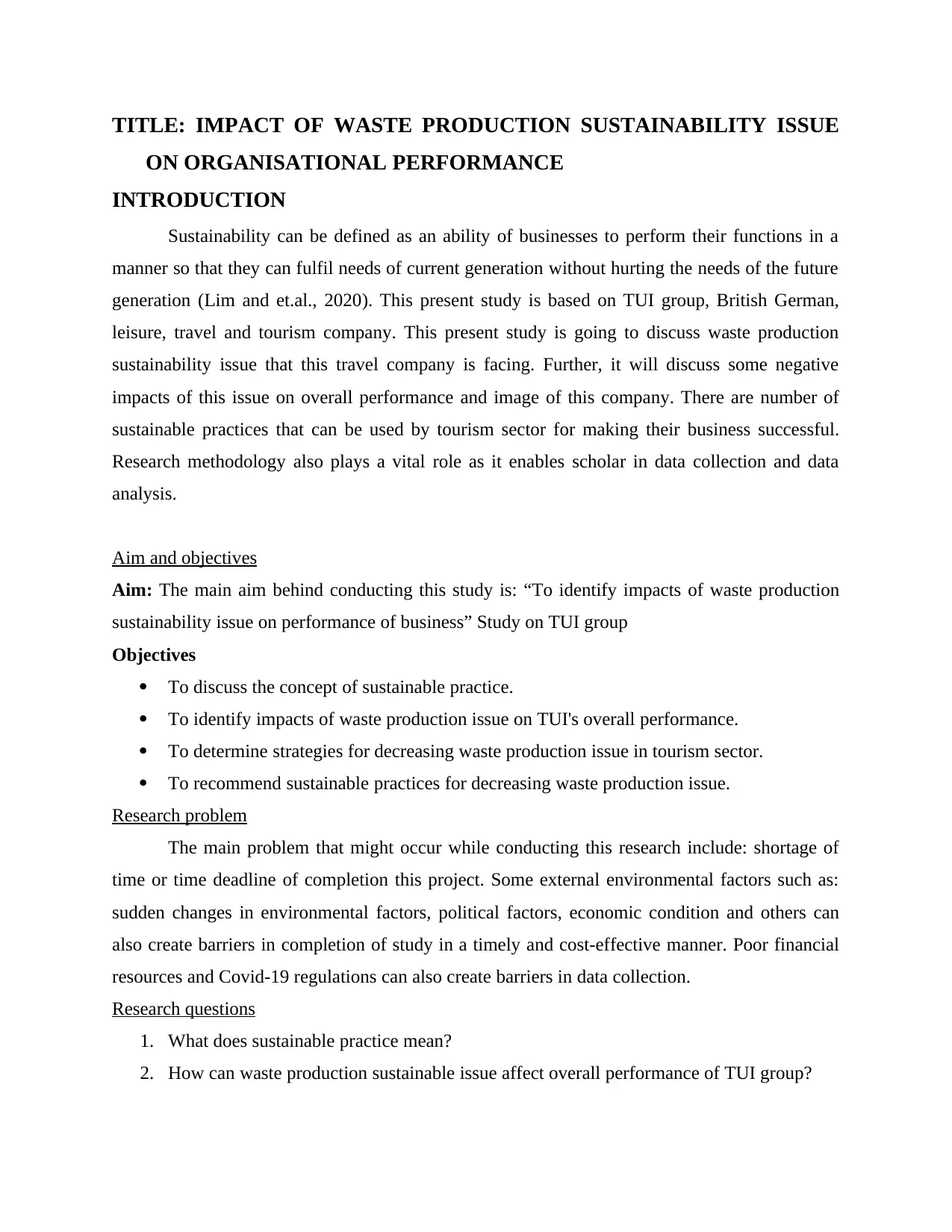
TITLE: IMPACT OF WASTE PRODUCTION SUSTAINABILITY ISSUE
ON ORGANISATIONAL PERFORMANCE
INTRODUCTION
Sustainability can be defined as an ability of businesses to perform their functions in a
manner so that they can fulfil needs of current generation without hurting the needs of the future
generation (Lim and et.al., 2020). This present study is based on TUI group, British German,
leisure, travel and tourism company. This present study is going to discuss waste production
sustainability issue that this travel company is facing. Further, it will discuss some negative
impacts of this issue on overall performance and image of this company. There are number of
sustainable practices that can be used by tourism sector for making their business successful.
Research methodology also plays a vital role as it enables scholar in data collection and data
analysis.
Aim and objectives
Aim: The main aim behind conducting this study is: “To identify impacts of waste production
sustainability issue on performance of business” Study on TUI group
Objectives
To discuss the concept of sustainable practice.
To identify impacts of waste production issue on TUI's overall performance.
To determine strategies for decreasing waste production issue in tourism sector.
To recommend sustainable practices for decreasing waste production issue.
Research problem
The main problem that might occur while conducting this research include: shortage of
time or time deadline of completion this project. Some external environmental factors such as:
sudden changes in environmental factors, political factors, economic condition and others can
also create barriers in completion of study in a timely and cost-effective manner. Poor financial
resources and Covid-19 regulations can also create barriers in data collection.
Research questions
1. What does sustainable practice mean?
2. How can waste production sustainable issue affect overall performance of TUI group?
ON ORGANISATIONAL PERFORMANCE
INTRODUCTION
Sustainability can be defined as an ability of businesses to perform their functions in a
manner so that they can fulfil needs of current generation without hurting the needs of the future
generation (Lim and et.al., 2020). This present study is based on TUI group, British German,
leisure, travel and tourism company. This present study is going to discuss waste production
sustainability issue that this travel company is facing. Further, it will discuss some negative
impacts of this issue on overall performance and image of this company. There are number of
sustainable practices that can be used by tourism sector for making their business successful.
Research methodology also plays a vital role as it enables scholar in data collection and data
analysis.
Aim and objectives
Aim: The main aim behind conducting this study is: “To identify impacts of waste production
sustainability issue on performance of business” Study on TUI group
Objectives
To discuss the concept of sustainable practice.
To identify impacts of waste production issue on TUI's overall performance.
To determine strategies for decreasing waste production issue in tourism sector.
To recommend sustainable practices for decreasing waste production issue.
Research problem
The main problem that might occur while conducting this research include: shortage of
time or time deadline of completion this project. Some external environmental factors such as:
sudden changes in environmental factors, political factors, economic condition and others can
also create barriers in completion of study in a timely and cost-effective manner. Poor financial
resources and Covid-19 regulations can also create barriers in data collection.
Research questions
1. What does sustainable practice mean?
2. How can waste production sustainable issue affect overall performance of TUI group?
⊘ This is a preview!⊘
Do you want full access?
Subscribe today to unlock all pages.

Trusted by 1+ million students worldwide
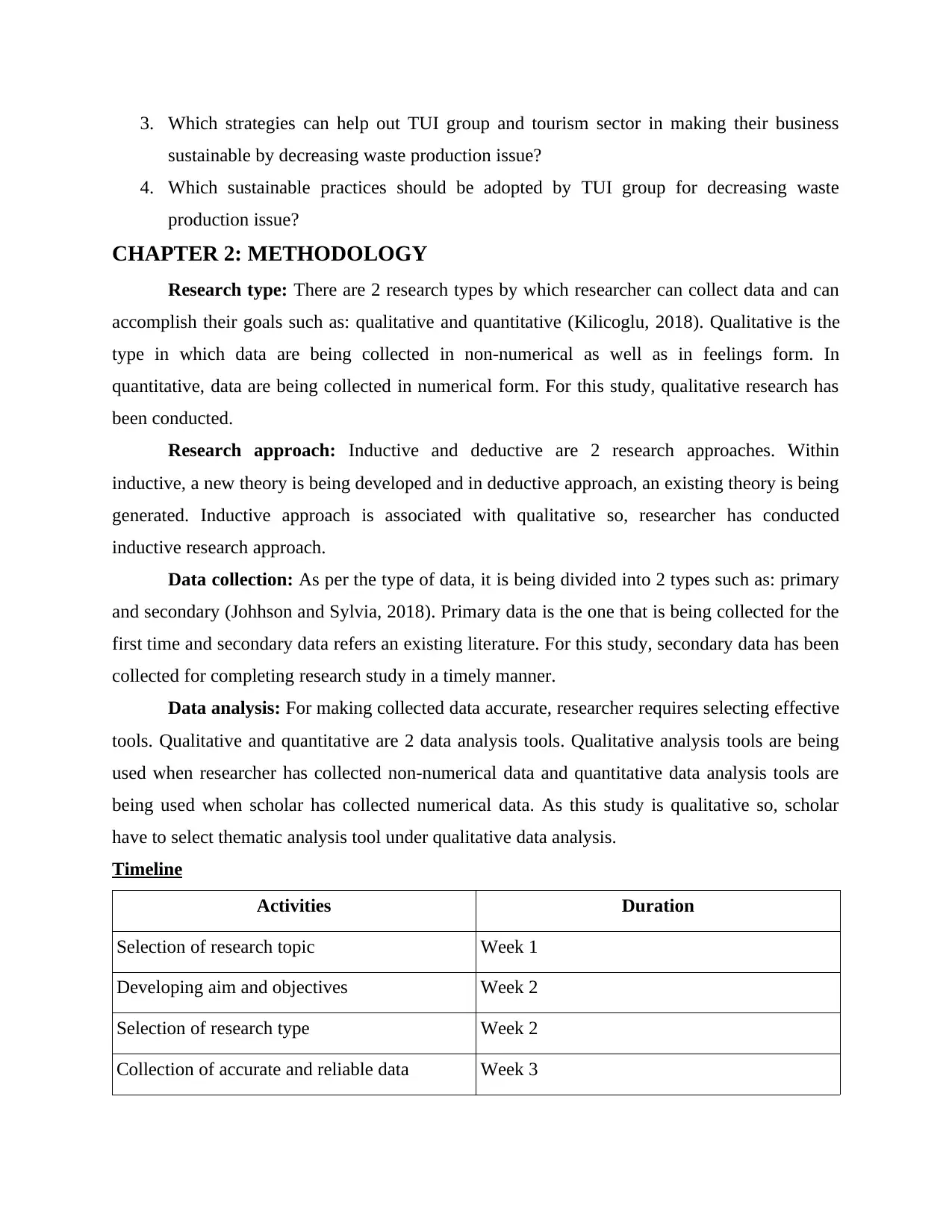
3. Which strategies can help out TUI group and tourism sector in making their business
sustainable by decreasing waste production issue?
4. Which sustainable practices should be adopted by TUI group for decreasing waste
production issue?
CHAPTER 2: METHODOLOGY
Research type: There are 2 research types by which researcher can collect data and can
accomplish their goals such as: qualitative and quantitative (Kilicoglu, 2018). Qualitative is the
type in which data are being collected in non-numerical as well as in feelings form. In
quantitative, data are being collected in numerical form. For this study, qualitative research has
been conducted.
Research approach: Inductive and deductive are 2 research approaches. Within
inductive, a new theory is being developed and in deductive approach, an existing theory is being
generated. Inductive approach is associated with qualitative so, researcher has conducted
inductive research approach.
Data collection: As per the type of data, it is being divided into 2 types such as: primary
and secondary (Johhson and Sylvia, 2018). Primary data is the one that is being collected for the
first time and secondary data refers an existing literature. For this study, secondary data has been
collected for completing research study in a timely manner.
Data analysis: For making collected data accurate, researcher requires selecting effective
tools. Qualitative and quantitative are 2 data analysis tools. Qualitative analysis tools are being
used when researcher has collected non-numerical data and quantitative data analysis tools are
being used when scholar has collected numerical data. As this study is qualitative so, scholar
have to select thematic analysis tool under qualitative data analysis.
Timeline
Activities Duration
Selection of research topic Week 1
Developing aim and objectives Week 2
Selection of research type Week 2
Collection of accurate and reliable data Week 3
sustainable by decreasing waste production issue?
4. Which sustainable practices should be adopted by TUI group for decreasing waste
production issue?
CHAPTER 2: METHODOLOGY
Research type: There are 2 research types by which researcher can collect data and can
accomplish their goals such as: qualitative and quantitative (Kilicoglu, 2018). Qualitative is the
type in which data are being collected in non-numerical as well as in feelings form. In
quantitative, data are being collected in numerical form. For this study, qualitative research has
been conducted.
Research approach: Inductive and deductive are 2 research approaches. Within
inductive, a new theory is being developed and in deductive approach, an existing theory is being
generated. Inductive approach is associated with qualitative so, researcher has conducted
inductive research approach.
Data collection: As per the type of data, it is being divided into 2 types such as: primary
and secondary (Johhson and Sylvia, 2018). Primary data is the one that is being collected for the
first time and secondary data refers an existing literature. For this study, secondary data has been
collected for completing research study in a timely manner.
Data analysis: For making collected data accurate, researcher requires selecting effective
tools. Qualitative and quantitative are 2 data analysis tools. Qualitative analysis tools are being
used when researcher has collected non-numerical data and quantitative data analysis tools are
being used when scholar has collected numerical data. As this study is qualitative so, scholar
have to select thematic analysis tool under qualitative data analysis.
Timeline
Activities Duration
Selection of research topic Week 1
Developing aim and objectives Week 2
Selection of research type Week 2
Collection of accurate and reliable data Week 3
Paraphrase This Document
Need a fresh take? Get an instant paraphrase of this document with our AI Paraphraser
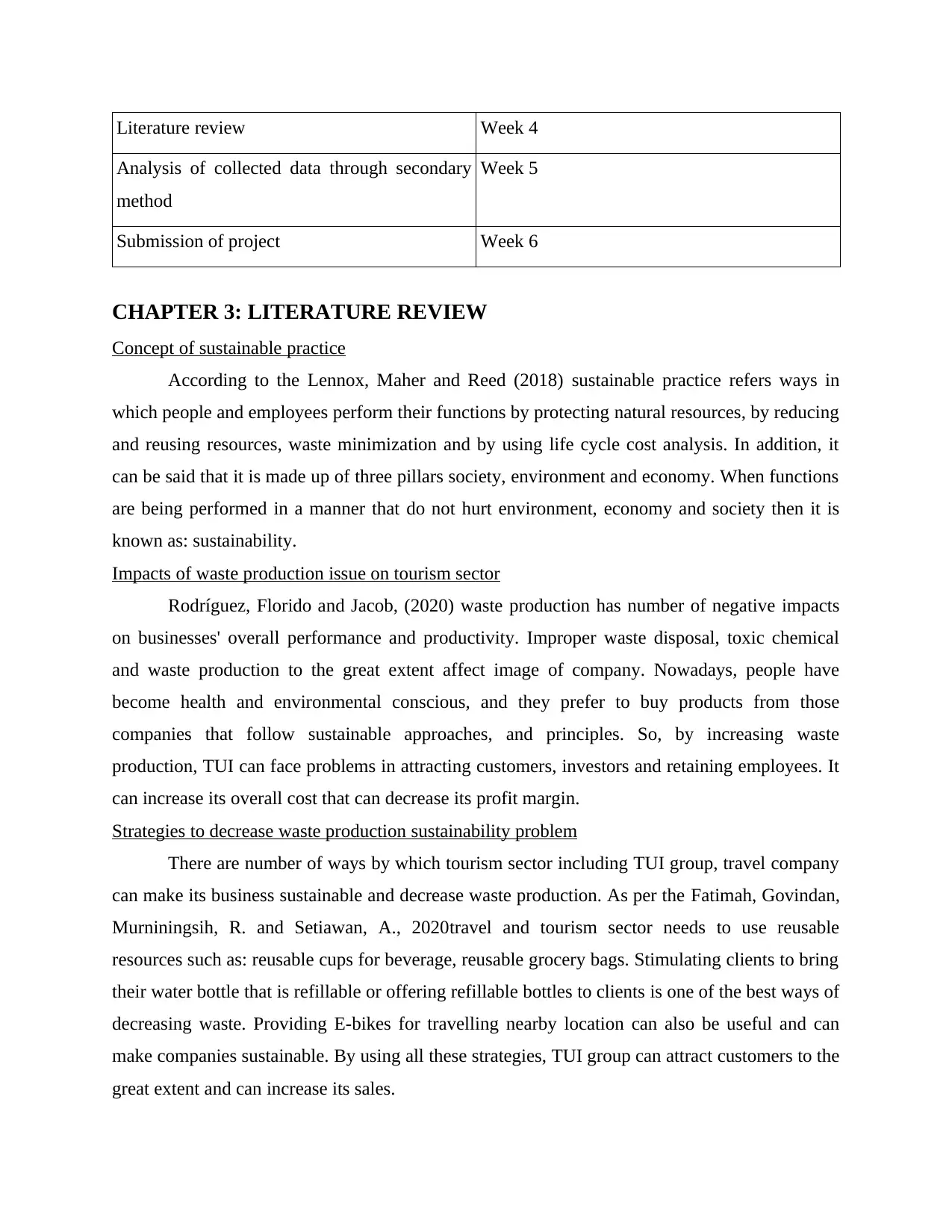
Literature review Week 4
Analysis of collected data through secondary
method
Week 5
Submission of project Week 6
CHAPTER 3: LITERATURE REVIEW
Concept of sustainable practice
According to the Lennox, Maher and Reed (2018) sustainable practice refers ways in
which people and employees perform their functions by protecting natural resources, by reducing
and reusing resources, waste minimization and by using life cycle cost analysis. In addition, it
can be said that it is made up of three pillars society, environment and economy. When functions
are being performed in a manner that do not hurt environment, economy and society then it is
known as: sustainability.
Impacts of waste production issue on tourism sector
Rodríguez, Florido and Jacob, (2020) waste production has number of negative impacts
on businesses' overall performance and productivity. Improper waste disposal, toxic chemical
and waste production to the great extent affect image of company. Nowadays, people have
become health and environmental conscious, and they prefer to buy products from those
companies that follow sustainable approaches, and principles. So, by increasing waste
production, TUI can face problems in attracting customers, investors and retaining employees. It
can increase its overall cost that can decrease its profit margin.
Strategies to decrease waste production sustainability problem
There are number of ways by which tourism sector including TUI group, travel company
can make its business sustainable and decrease waste production. As per the Fatimah, Govindan,
Murniningsih, R. and Setiawan, A., 2020travel and tourism sector needs to use reusable
resources such as: reusable cups for beverage, reusable grocery bags. Stimulating clients to bring
their water bottle that is refillable or offering refillable bottles to clients is one of the best ways of
decreasing waste. Providing E-bikes for travelling nearby location can also be useful and can
make companies sustainable. By using all these strategies, TUI group can attract customers to the
great extent and can increase its sales.
Analysis of collected data through secondary
method
Week 5
Submission of project Week 6
CHAPTER 3: LITERATURE REVIEW
Concept of sustainable practice
According to the Lennox, Maher and Reed (2018) sustainable practice refers ways in
which people and employees perform their functions by protecting natural resources, by reducing
and reusing resources, waste minimization and by using life cycle cost analysis. In addition, it
can be said that it is made up of three pillars society, environment and economy. When functions
are being performed in a manner that do not hurt environment, economy and society then it is
known as: sustainability.
Impacts of waste production issue on tourism sector
Rodríguez, Florido and Jacob, (2020) waste production has number of negative impacts
on businesses' overall performance and productivity. Improper waste disposal, toxic chemical
and waste production to the great extent affect image of company. Nowadays, people have
become health and environmental conscious, and they prefer to buy products from those
companies that follow sustainable approaches, and principles. So, by increasing waste
production, TUI can face problems in attracting customers, investors and retaining employees. It
can increase its overall cost that can decrease its profit margin.
Strategies to decrease waste production sustainability problem
There are number of ways by which tourism sector including TUI group, travel company
can make its business sustainable and decrease waste production. As per the Fatimah, Govindan,
Murniningsih, R. and Setiawan, A., 2020travel and tourism sector needs to use reusable
resources such as: reusable cups for beverage, reusable grocery bags. Stimulating clients to bring
their water bottle that is refillable or offering refillable bottles to clients is one of the best ways of
decreasing waste. Providing E-bikes for travelling nearby location can also be useful and can
make companies sustainable. By using all these strategies, TUI group can attract customers to the
great extent and can increase its sales.
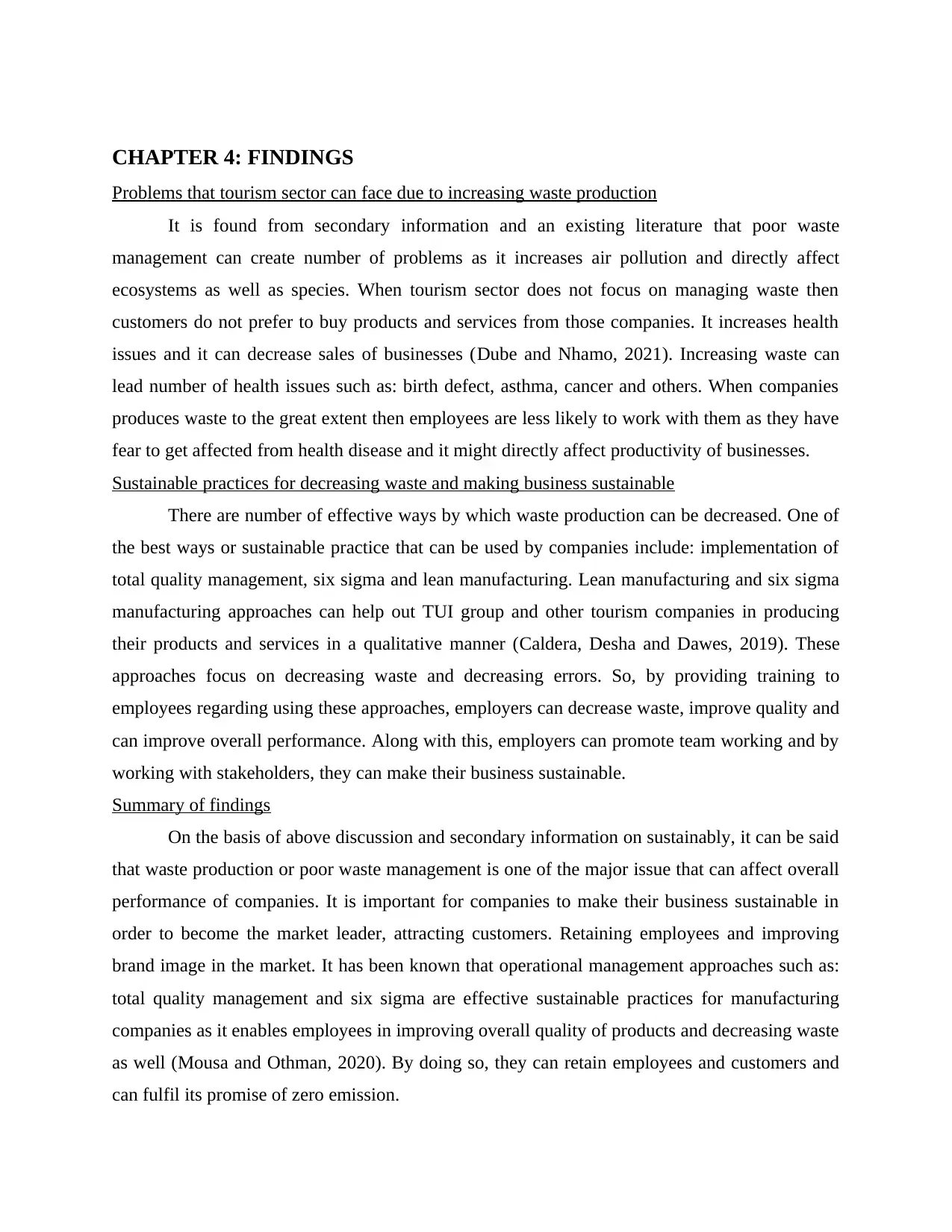
CHAPTER 4: FINDINGS
Problems that tourism sector can face due to increasing waste production
It is found from secondary information and an existing literature that poor waste
management can create number of problems as it increases air pollution and directly affect
ecosystems as well as species. When tourism sector does not focus on managing waste then
customers do not prefer to buy products and services from those companies. It increases health
issues and it can decrease sales of businesses (Dube and Nhamo, 2021). Increasing waste can
lead number of health issues such as: birth defect, asthma, cancer and others. When companies
produces waste to the great extent then employees are less likely to work with them as they have
fear to get affected from health disease and it might directly affect productivity of businesses.
Sustainable practices for decreasing waste and making business sustainable
There are number of effective ways by which waste production can be decreased. One of
the best ways or sustainable practice that can be used by companies include: implementation of
total quality management, six sigma and lean manufacturing. Lean manufacturing and six sigma
manufacturing approaches can help out TUI group and other tourism companies in producing
their products and services in a qualitative manner (Caldera, Desha and Dawes, 2019). These
approaches focus on decreasing waste and decreasing errors. So, by providing training to
employees regarding using these approaches, employers can decrease waste, improve quality and
can improve overall performance. Along with this, employers can promote team working and by
working with stakeholders, they can make their business sustainable.
Summary of findings
On the basis of above discussion and secondary information on sustainably, it can be said
that waste production or poor waste management is one of the major issue that can affect overall
performance of companies. It is important for companies to make their business sustainable in
order to become the market leader, attracting customers. Retaining employees and improving
brand image in the market. It has been known that operational management approaches such as:
total quality management and six sigma are effective sustainable practices for manufacturing
companies as it enables employees in improving overall quality of products and decreasing waste
as well (Mousa and Othman, 2020). By doing so, they can retain employees and customers and
can fulfil its promise of zero emission.
Problems that tourism sector can face due to increasing waste production
It is found from secondary information and an existing literature that poor waste
management can create number of problems as it increases air pollution and directly affect
ecosystems as well as species. When tourism sector does not focus on managing waste then
customers do not prefer to buy products and services from those companies. It increases health
issues and it can decrease sales of businesses (Dube and Nhamo, 2021). Increasing waste can
lead number of health issues such as: birth defect, asthma, cancer and others. When companies
produces waste to the great extent then employees are less likely to work with them as they have
fear to get affected from health disease and it might directly affect productivity of businesses.
Sustainable practices for decreasing waste and making business sustainable
There are number of effective ways by which waste production can be decreased. One of
the best ways or sustainable practice that can be used by companies include: implementation of
total quality management, six sigma and lean manufacturing. Lean manufacturing and six sigma
manufacturing approaches can help out TUI group and other tourism companies in producing
their products and services in a qualitative manner (Caldera, Desha and Dawes, 2019). These
approaches focus on decreasing waste and decreasing errors. So, by providing training to
employees regarding using these approaches, employers can decrease waste, improve quality and
can improve overall performance. Along with this, employers can promote team working and by
working with stakeholders, they can make their business sustainable.
Summary of findings
On the basis of above discussion and secondary information on sustainably, it can be said
that waste production or poor waste management is one of the major issue that can affect overall
performance of companies. It is important for companies to make their business sustainable in
order to become the market leader, attracting customers. Retaining employees and improving
brand image in the market. It has been known that operational management approaches such as:
total quality management and six sigma are effective sustainable practices for manufacturing
companies as it enables employees in improving overall quality of products and decreasing waste
as well (Mousa and Othman, 2020). By doing so, they can retain employees and customers and
can fulfil its promise of zero emission.
⊘ This is a preview!⊘
Do you want full access?
Subscribe today to unlock all pages.

Trusted by 1+ million students worldwide
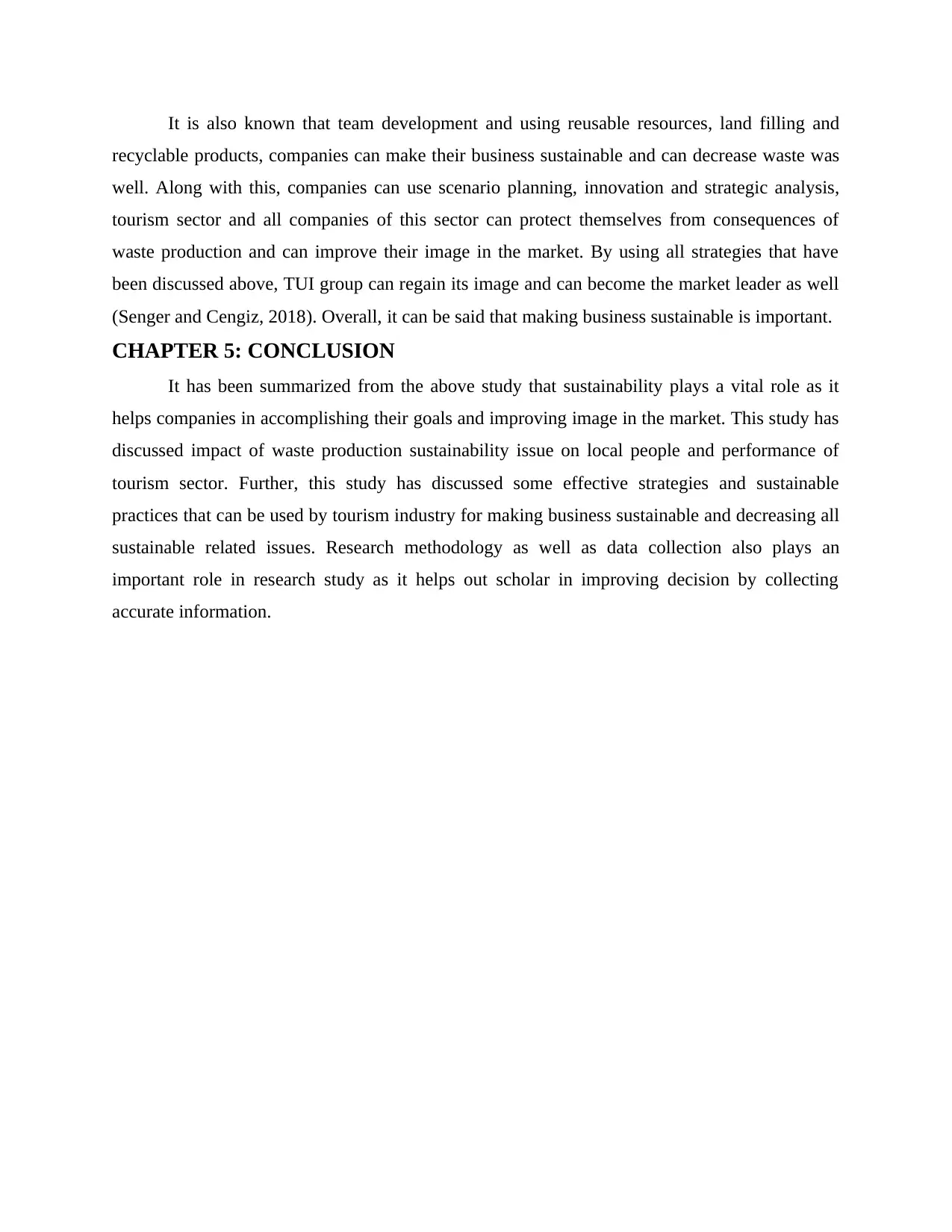
It is also known that team development and using reusable resources, land filling and
recyclable products, companies can make their business sustainable and can decrease waste was
well. Along with this, companies can use scenario planning, innovation and strategic analysis,
tourism sector and all companies of this sector can protect themselves from consequences of
waste production and can improve their image in the market. By using all strategies that have
been discussed above, TUI group can regain its image and can become the market leader as well
(Senger and Cengiz, 2018). Overall, it can be said that making business sustainable is important.
CHAPTER 5: CONCLUSION
It has been summarized from the above study that sustainability plays a vital role as it
helps companies in accomplishing their goals and improving image in the market. This study has
discussed impact of waste production sustainability issue on local people and performance of
tourism sector. Further, this study has discussed some effective strategies and sustainable
practices that can be used by tourism industry for making business sustainable and decreasing all
sustainable related issues. Research methodology as well as data collection also plays an
important role in research study as it helps out scholar in improving decision by collecting
accurate information.
recyclable products, companies can make their business sustainable and can decrease waste was
well. Along with this, companies can use scenario planning, innovation and strategic analysis,
tourism sector and all companies of this sector can protect themselves from consequences of
waste production and can improve their image in the market. By using all strategies that have
been discussed above, TUI group can regain its image and can become the market leader as well
(Senger and Cengiz, 2018). Overall, it can be said that making business sustainable is important.
CHAPTER 5: CONCLUSION
It has been summarized from the above study that sustainability plays a vital role as it
helps companies in accomplishing their goals and improving image in the market. This study has
discussed impact of waste production sustainability issue on local people and performance of
tourism sector. Further, this study has discussed some effective strategies and sustainable
practices that can be used by tourism industry for making business sustainable and decreasing all
sustainable related issues. Research methodology as well as data collection also plays an
important role in research study as it helps out scholar in improving decision by collecting
accurate information.
Paraphrase This Document
Need a fresh take? Get an instant paraphrase of this document with our AI Paraphraser
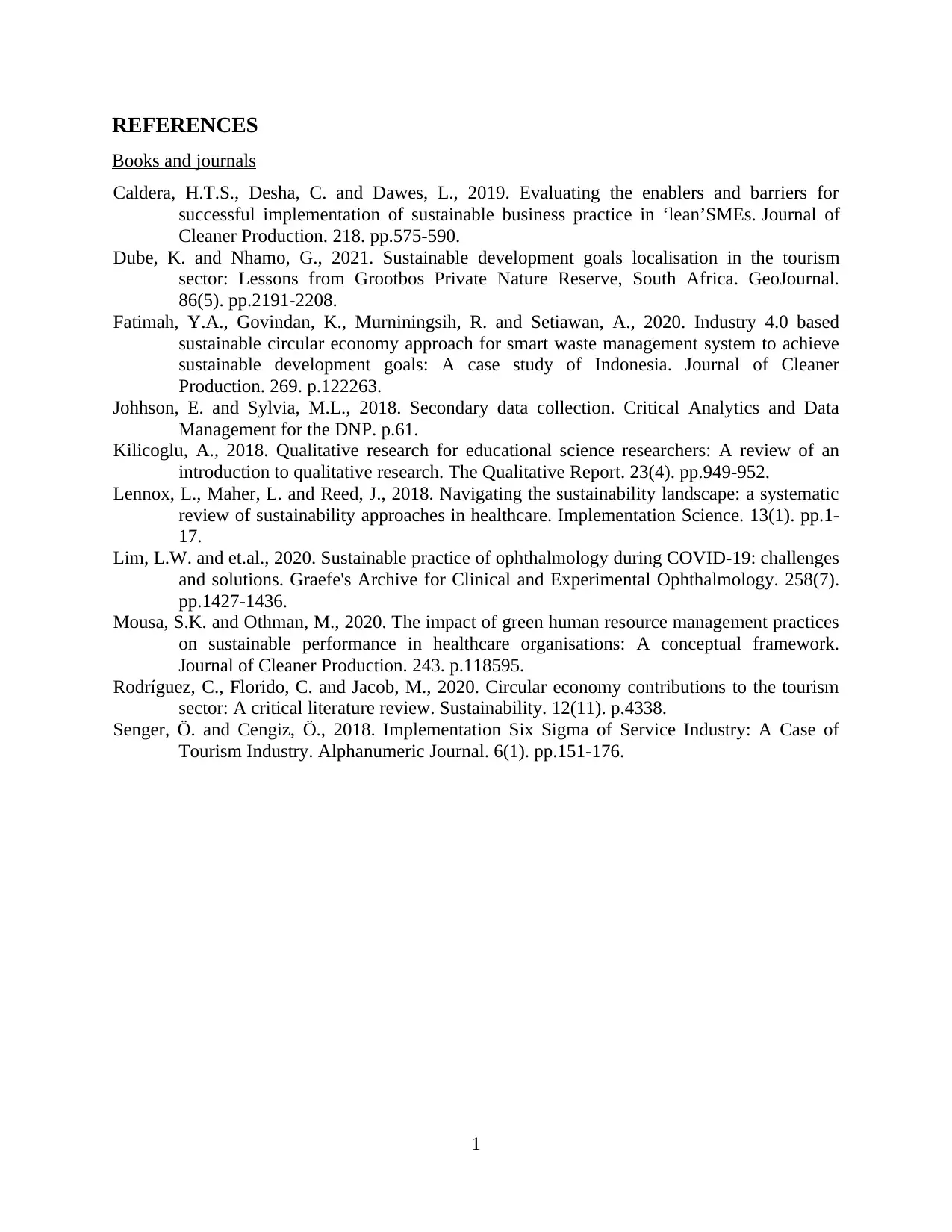
REFERENCES
Books and journals
Caldera, H.T.S., Desha, C. and Dawes, L., 2019. Evaluating the enablers and barriers for
successful implementation of sustainable business practice in ‘lean’SMEs. Journal of
Cleaner Production. 218. pp.575-590.
Dube, K. and Nhamo, G., 2021. Sustainable development goals localisation in the tourism
sector: Lessons from Grootbos Private Nature Reserve, South Africa. GeoJournal.
86(5). pp.2191-2208.
Fatimah, Y.A., Govindan, K., Murniningsih, R. and Setiawan, A., 2020. Industry 4.0 based
sustainable circular economy approach for smart waste management system to achieve
sustainable development goals: A case study of Indonesia. Journal of Cleaner
Production. 269. p.122263.
Johhson, E. and Sylvia, M.L., 2018. Secondary data collection. Critical Analytics and Data
Management for the DNP. p.61.
Kilicoglu, A., 2018. Qualitative research for educational science researchers: A review of an
introduction to qualitative research. The Qualitative Report. 23(4). pp.949-952.
Lennox, L., Maher, L. and Reed, J., 2018. Navigating the sustainability landscape: a systematic
review of sustainability approaches in healthcare. Implementation Science. 13(1). pp.1-
17.
Lim, L.W. and et.al., 2020. Sustainable practice of ophthalmology during COVID-19: challenges
and solutions. Graefe's Archive for Clinical and Experimental Ophthalmology. 258(7).
pp.1427-1436.
Mousa, S.K. and Othman, M., 2020. The impact of green human resource management practices
on sustainable performance in healthcare organisations: A conceptual framework.
Journal of Cleaner Production. 243. p.118595.
Rodríguez, C., Florido, C. and Jacob, M., 2020. Circular economy contributions to the tourism
sector: A critical literature review. Sustainability. 12(11). p.4338.
Senger, Ö. and Cengiz, Ö., 2018. Implementation Six Sigma of Service Industry: A Case of
Tourism Industry. Alphanumeric Journal. 6(1). pp.151-176.
1
Books and journals
Caldera, H.T.S., Desha, C. and Dawes, L., 2019. Evaluating the enablers and barriers for
successful implementation of sustainable business practice in ‘lean’SMEs. Journal of
Cleaner Production. 218. pp.575-590.
Dube, K. and Nhamo, G., 2021. Sustainable development goals localisation in the tourism
sector: Lessons from Grootbos Private Nature Reserve, South Africa. GeoJournal.
86(5). pp.2191-2208.
Fatimah, Y.A., Govindan, K., Murniningsih, R. and Setiawan, A., 2020. Industry 4.0 based
sustainable circular economy approach for smart waste management system to achieve
sustainable development goals: A case study of Indonesia. Journal of Cleaner
Production. 269. p.122263.
Johhson, E. and Sylvia, M.L., 2018. Secondary data collection. Critical Analytics and Data
Management for the DNP. p.61.
Kilicoglu, A., 2018. Qualitative research for educational science researchers: A review of an
introduction to qualitative research. The Qualitative Report. 23(4). pp.949-952.
Lennox, L., Maher, L. and Reed, J., 2018. Navigating the sustainability landscape: a systematic
review of sustainability approaches in healthcare. Implementation Science. 13(1). pp.1-
17.
Lim, L.W. and et.al., 2020. Sustainable practice of ophthalmology during COVID-19: challenges
and solutions. Graefe's Archive for Clinical and Experimental Ophthalmology. 258(7).
pp.1427-1436.
Mousa, S.K. and Othman, M., 2020. The impact of green human resource management practices
on sustainable performance in healthcare organisations: A conceptual framework.
Journal of Cleaner Production. 243. p.118595.
Rodríguez, C., Florido, C. and Jacob, M., 2020. Circular economy contributions to the tourism
sector: A critical literature review. Sustainability. 12(11). p.4338.
Senger, Ö. and Cengiz, Ö., 2018. Implementation Six Sigma of Service Industry: A Case of
Tourism Industry. Alphanumeric Journal. 6(1). pp.151-176.
1
1 out of 8
Related Documents
Your All-in-One AI-Powered Toolkit for Academic Success.
+13062052269
info@desklib.com
Available 24*7 on WhatsApp / Email
![[object Object]](/_next/static/media/star-bottom.7253800d.svg)
Unlock your academic potential
Copyright © 2020–2025 A2Z Services. All Rights Reserved. Developed and managed by ZUCOL.





